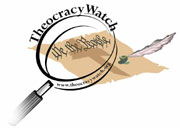|
A Biblical Worldview is defined in a Barna Report as
someone [who] believe[s] that absolute moral truth exists; that the source of moral truth is the Bible; that the Bible is accurate in all of the principles it teaches; that eternal spiritual salvation cannot be earned; that Jesus lived a sinless life on earth; that every person has a responsibility to share their religious beliefs with others; that Satan is a living force, not just a symbol of evil; and that God is the all-knowing, all-powerful maker of the universe who still rules that creation today.
"What is The Barna Group, Ltd.?" (from their web site) :
Through its five divisions, The Barna Group provides primary research (The Barna Research Group); communications tools (BarnaFilms); printed resources (BarnaBooks); leadership development for young people (The Josiah Corps); and church facilitation and enhancement (Transformation Church Network). The ultimate aim of the firm is to partner with Christian ministries and individuals to be a catalyst in moral and spiritual transformation in the United States. It accomplishes these outcomes by providing vision, information, evaluation and resources through a network of intimate partnerships. Among its strategic partners are Church Communication Network, EMI Christian Music Group, Filmdisc, HollywoodJesus.com, Kingdom Inc., and Tyndale House Publishers.
From America's Providential History, a dominionist textbook popular in Christian schools and the Christian homeschool movement:
Biblical Scholarship is the ability to reason from Biblical principles and relate it to all of life. Not only did early American Christians reason from the Bible, but even non-Christians were trained in this manner and held to a Biblical worldview.
The American Prospect provides a more comprehensive definition in Student Body Right:
The concept of worldview has come to occupy such a central place in Christian higher education that some administrators now fear that it's turning into a buzzword. Simply put, a Christian worldview is one that takes as its ultimate premises the truth of both testaments of the Bible: God's creation of the earth and the fall of man through original sin from the Old Testament, and, from the New, redemption through Christ.
This framework can be, and is, interpreted and applied in myriad contradictory ways. At its best, worldview pushes students to rethink settled positions, to wrestle with what a Christian's duty is to the poor or the in?rm or those on death row. It can create a sense of mission and moral obligation that produces students who sound strikingly like liberals -- vowing never to "sell out," determined to do more than simply make a lot of money. At its worst, though, worldview reduces to an uncritical acceptance of a handful of issue positions that have come to dominate the political energies of the religious right; it is the ideological bus that picks people up at church and drops them off at the voting booth. For this reason, understanding what a Christian worldview means and how it plays out in the professional and political sphere is crucial to understanding not only the explosive growth of evangelical higher education but the mechanism by which American evangelicals increasingly identify a speci?c political party and set of policies as the one true expression of the Christian faith.
Last updated: August-2005 |
